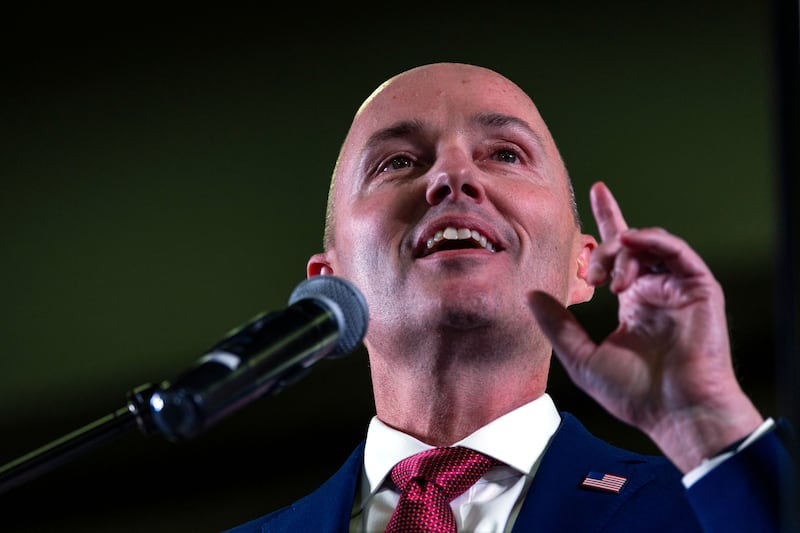Utah State Republican delegates shouted and voted their disapproval of Gov. Spencer Cox at the state GOP nominating convention on Saturday.
Cox received just 32.5% of the vote in the second and final round of voting while Rep. Phil Lyman, R-Blanding, received 67.5%, ensuring his place as the official Utah GOP gubernatorial nominee ahead of the June 25 primary where he and Cox will face a wider demographic of Utah Republican voters.
When the incumbent governor first took the stage in his first reelection test since being elected, he was met with some applause and a chorus of boos, forcing him to pause before choosing to abandon his prepared remarks to respond to his unwelcome reception.
“I’m a little worried about our caucus convention system,” Cox said. “There are a whole bunch of people out there who want to get rid of this. … I hope you’re not giving them more ammunition today.”
Cox listed previous candidates who had been booed on the state convention stage, including former Utah governors Mike Leavitt and Gary Herbert, who lost at convention and then later won by large margins in primary elections among all Utah registered Republicans.
Cox also listed some of the accomplishments from his first term in office which he framed as conservative wins that Republican voters would normally support.
“Maybe you’re upset that I signed the largest tax cut in Utah history. Maybe you hate that I signed constitutional carry. Maybe you hate that I signed the most pro-life legislation in Utah history. Maybe you hate that I sent troops to the border. Maybe you hate the 60 lawsuits we filed against President Biden in this administration. Maybe you hate that we stopped DEI and ESG and CRT,” he said.
“Or maybe it’s something much more cynical. Maybe you hate that I don’t hate enough.”

Lyman, who received 44% in the first round of voting, putting him ahead of his opponents, used his two speeches to criticize COVID-19 lockdowns, government corruption and Cox’s message of signing the largest tax cut in Utah history.
Many in the crowd cheered as he climbed the stairs to the stage. He began his sales pitch to Utah delegates with a reference to his short stay in jail in 2015 after he was convicted of conspiring to operate off-road vehicles on public lands closed to vehicles in 2014.
“I don’t want to build prisons in Utah, I want to build roads,” Lyman said.
Former state GOP chair Carson Jorgensen spent his four minutes bashing the governor for his “Disagree Better” initiative. He received 26% of the first round vote.
“Pretending to disagree lets you pretend to be a conservative,” Jorgensen said. “Is anybody here ready for a real Republican governor?”
Marine Corps artillery officer Scott Robbins and Bountiful business owner Sylvia Miera-Fisk both received less than 1% of the vote.
Jorgensen, Robbins and Fisk were eliminated after the first round of voting.
Cox has already qualified for the GOP primary by gathering 28,000 certified signatures. The other three candidates made their electoral appeal directly to delegates.
1st Congressional District results
Incumbent Rep. Blake Moore faced two challengers at convention — Ogden electrician Paul Miller and former Ogden police officer Derek Draper.
State delegates voted to advance Moore and Miller to the primary election. Moore is the only candidate to have qualified ahead of the convention for the Republican primary as he collected 7,000 certified signatures.
In the first round of voting, Moore (45.29%) and Miller (33.56%) advanced. Draper, who received 21.15% of the vote, did not move on. During the second round of voting, Miller received 54.86% of the vote while Moore got 45.14%.
Moore was recently elected to serve as vice chair of the House Republican Conference, the seventh highest ranking position in the House.
Moore referenced the last time he stood for a vote at convention two years ago. “I stood before you, pledging to win back a Republican majority,” he said. “And thanks to you and Americans across the country, we took back the House and fired Nancy Pelosi.”
Since Moore has taken office, he said that the Republicans have been able to downsize government. “We have not been able to shrink the government like this in the last decade.”
“I have demonstrated commitment to conservative principles,” Moore said, pointing toward his voting record and committee work. “And I am humbly asking for your vote.”
Miller led his speech by referencing his background as an electrician. “I never thought that I would run for a Republican office, but we need change in Washington D.C.,” he said. He also spent part of his remarks criticizing Moore for allegedly always voting yes on spending bills, despite talking about cutting the deficit.
If elected, Miller said, “I’d vote no on spending bills” until Congress could get rid of wasteful spending. “Compromising is morally and financially bankrupting our nation,” he said.
Draper, a disabled veteran and retired Ogden police officer, said his working class background would make him a better representative. “I decided to run because it’s people like us that built this country,” Draper said. He spoke about his background as a disabled veteran and retired Ogden police officer.
Both Miller and Moore will appear on the June 25 primary ballot.
4th Congressional District results
Burgess Owens is running unopposed for the Republican nomination. When a candidate runs unopposed, the process is for them to vote by acclamation — one of Robert’s Rules of Order that means cheers or applause from the crowd rather than a ballot constitutes a vote.
During Owens’ speech before convention, he was critical of bigotry on campus and emphasized the need for safety.



